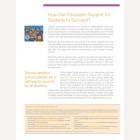Research shows transformational benefits of trauma-sensitive school culture

Research on trauma-sensitive schools provides timely insights for educating students during this time of unprecedented crises. Boston University researchers completed “An Evaluation of the Trauma and Learning Policy Initiative’s (TLPI) Inquiry-Based Process: Year Three.” The report evaluated the efficacy and sustainability of the trauma-sensitive culture changes that occurred in three demonstration schools that used TLPI’s inquiry-based process.



